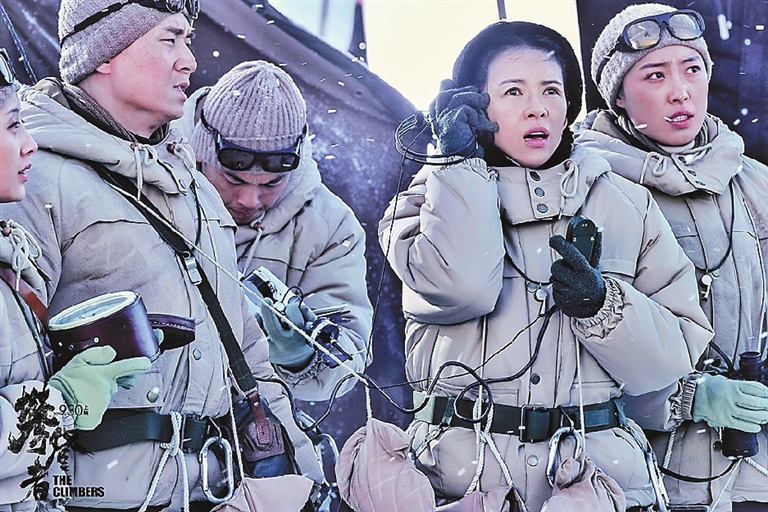
Starring: Wu Jing, Zhang Ziyi, Zhang Yi, Jing Boran, Hu Ge, Wang Jing-Chun, He Lin, Chen Long, Liu Xiaofeng, Quni Ciren Director: Daniel Lee AS the world’s tallest peak, Mount Qomolangma, also known as Mount Everest, has by this point been mythologized and romanticized by every nation and every team that has ever scaled its 8,000-plus meters since Edmund Hillary in 1953 — and possibly George Mallory in 1924. Its natural hazards have played a part in painting those who make it to the summit as wounded warriors: Baltasar Kormakur’s “Everest” and Jon Krakauer’s best-seller “Into Thin Air,” both about one of the mountain’s deadliest seasons, are just two examples. Into this tradition comes Daniel Lee’s “The Climbers,” a suitably spectacular and big-budget adventure timed for release to celebrate China’s National Day on Oct. 1. Anchored by “The Wandering Earth” and “Wolf Warrior 2” star Wu Jing, “The Climbers” goes heavy on bombast and heart-pounding peril (so many storms) in detailing the first documented north face ascent of Qomolangma in 1975 to the glory of China. The adventure begins with Fang Wuzhou (Wu) making an attempt to the summit in 1960, where he loses most of his team to an avalanche. In the ensuing years, China enters into the “Cultural Revolution,” and gives up its mountaineering aspirations. Fang, however, stays in shape, even though he’s shunned, and doubt is thrown on the truth of the ’60 climb. But upon being told the first Chinese ascent is invalid due to lack of photographic evidence (Fang dropped the camera to save a teammate), the powers that be decide to go again and do a survey — because in Fang’s former captain’s words, “This is our mountain.” “The Climbers” then sets out on a getting-the-band-back-together montage, the old group including Qu Songlin (Zhang Yi, “Ash Is Purest White”), who lost half an appendage to frostbite when he tried to finish the ’60 climb barefoot (that’s dedication), and Tibetan guide Jiebu (Lawang Lop). The new guys — of what appears to be about 50 — include photographer Li Guoliang (Jing Boran); lifelong Everest enthusiast Yang Guang (Hu Ge); Fang’s old flame, meteorologist Xu Ying (Zhang Ziyi); and pretty assistant Sherpa Mudan (Quni Ciren), who takes a liking to Li. With all that romance simmering, you know someone is eventually going to take a fatal fall or cough blood into their palm. But before that, to quote Matt Damon’s Mark Watney from “The Martian,” team leader Fang has to “Wu Jing” the mountain to make it to the top and reassess Everest’s height for all the world to see. Hong Kong director Lee (“14 Blades,” “White Vengeance”) pilots the Tsui Hark-styled action flourishes choreographed by Alan Ng and cinematographer Tony Cheung’s sweeping camera with aplomb, and actually manages to wring a few genuinely white-knuckle moments from among the silliness (50 guys and there’s only one camera?). The first avalanche, the last leg at Lhakpa-Ri (three times) and a lunatic nighttime storm featuring a rogue boulder stand out as highlights despite Henry Lai’s on-the-nose score and some wonky CGI. IMAX viewings could go a long way to boosting the inherently photogenic images; much of the film was shot on location in Tibet. And that’s really what the film is about: the mountain and the climb. The reality-based “characters” are given short shrift: Fang is painfully capable and compassionate; Qu is bitter over losing the camera 15 years before and living with the shame; Li and Yang are handsome; Mudan and Jiebu are Tibetan, and they’re just there to nod approvingly and give the thumbs up. None of the relationships transcend narrative function, and so death, rage and reconciliations ring hollow. Too many endings and romantic subplots that do nothing but bloat the running time and detract from the snowy action could easily have been jettisoned by editors Tang Manto and Li Lin for a leaner, loftier final product. The movie is now being screened in Shenzhen. (SD-Agencies) | 
